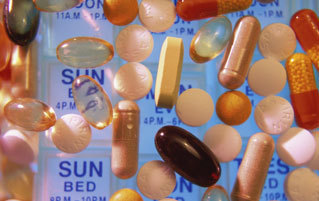4 Healthy Eating Habits (That Are Killing People)

Let's start right here by saying that no one at Cracked is a doctor or qualified to give out professional health advice. In fact, I'm required to tell people I'm not a doctor when I first meet them, ever since that incident in 2011 with the unauthorized appendix surgery on the cruise ship.

I'm just impressed that I was able to do it using only one of those tiny drink umbrellas.
And most of us, myself included, could stand to cram some more healthy food into our diets, instead of surviving on old bacon fat we scraped out of the bottom of the microwave. That said, not all healthy-living habits go well for everyone who tries them. Because of the eternal tendency of humans to take good things and overdo them until they're awful, we're now learning that ...
Cutting Too Much Salt Out of Your Diet Can Mess Up Your Health
Americans, you might have heard, eat way too much salt. The average person's daily salt intake in this country is 3.4 grams, which is well above the 1.5 grams recommended for most Americans by the American Heart Association.

They tried tipping over America's salt shakers and writing "bad" there, but everyone just licked up the salt so it didn't go well.
And that sucks, because consuming too much salt can lead to high blood pressure, which is in turn linked to heart disease, the leading cause of Grim Reaper visits in the United States. So there's no problem with trying to avoid as much salt as possible, is there, asks the poor man still posing a rhetorical question in a Cracked article and expecting a positive answer. Well, is there?
A recent study that monitored the salt intake and ongoing health of 100,000 people discovered that those who were least likely to die from heart disease or stroke had a sodium intake of between 3 and 6 grams per day. Another 2011 study of patients with high blood pressure found that their risk of stroke and heart attacks increased when they consumed over 7 grams per day, butit also increased when the subjects consumed under 3 grams. In other words, the American Heart Association's 1.5-gram figure seems to put most people firmly within the salt danger zone, not out of it.

I imagine the salt danger zone looks like this.
That's not too surprising, because according to a doctor who led an Institute of Medicine committee on salt consumption, 1.5 grams is the smallest amount of salt a human can consume while still getting the nutrients they need to survive.
So why is the AHA recommending starvation-level salt figures? It seems pretty harsh until you figure out what's really going on here. Much like a teacher who desperately sets 10 chapters of textbook reading every night in the hope that his lazy students will panic and at least skim a few pages, the AHA, knowing that Americans love salt, is presumably throwing out a low figure with the assumption that most people will ignore it anyway. And for the most part, they've been right: despite the AHA's decades of continued warnings, American salt consumption hasn't changed in 50 years.
But those poor, authority-trusting schmucks who actually did do all that reading in high school and are now genuinely trying their hardest to keep their salt at the 1.5-gram level? They might be hurting themselves more than if they'd just eaten those damn French fries.

Just lick the damn ground already, nerd.
Taking Too Many Vitamins Can Make You Dead
If you're like many Americans, you start the day by eating a multivitamin or two alongside your morning coffee and waffle taco. People in this country spend about $28 billion a year on vitamin supplements, which is about 28 times more than we spend on porn, so don't let anyone tell you that the world is going to hell. And while reviews are mixed about how much good multivitamins do for people without specific vitamin-requiring health issues, the standard wisdom is that dosing yourself with vitamins definitely won't do any harm. Well, except when it does.
The Dark SideFirst, let's look at the difference between fat- and water-soluble vitamins and nutrients. Water-soluble nutrients like Vitamin C, B12, and folic acid usually need to be consumed daily, because your body will mostly just pee out the excess. Fat-soluble stuff like Vitamins A, E, and K, on the other hand, is absorbed into your body fat and then sticks around, like that old LiveJournal full of Firefly fan fiction that you forgot the password to back in 2007. If you consume too many fat-soluble vitamins, they can build up in your body like the torrid sexual tension in a Mal/Jayne fanfic, leading to vitamin toxicity.

If you recover from Vitamin Toxicity, at least you'll have a good band name.
Of course, most people will not end up overdosed and twitching on their kitchen floor among a spilled pile of Flintstone gummies. Most of the time, the risks are more subtle. For example, men taking more than the recommended dose of Vitamin E have a higher risk of getting prostate cancer, while supplementation with beta carotene, a precursor to Vitamin A, has been linked to increased lung cancer in smokers. It's one reason many doctors recommend that unless you've got a specific medical reason to take vitamin or mineral supplements, you try to get your nutrients from food instead, or that you just curl up on your living room floor and give up because everything's going to kill you anyway.
Superfoods Are Screwing the World's Poor
If you can read, and something tells me you can, you will have seen the word "superfood" tossed around a bunch in the last few years. These foods, so we're told, are so packed with health-promoting superpowers that any movie about them would have trouble making them relatable to audiences.

The scriptwriters can just give the superfood a troubled relationship with a father figure. That always works.
Superfoods include boring stuff like kale and blueberries, but the label is also applied to newly popular exotic foods like quinoa and acai berry. If nothing else, these superfoods provide a handy shibboleth that allows health-food fanatics to distinguish themselves from posers: if you're ordering a meal at a hippie deli and actually know how to pronounce "acai" or "quinoa," the hippies will realize you're one of them and invite you back to their awesome ball-pit filled with tofu. Seriously, one of those words has more syllables than it should and the other doesn't have enough; try remembering which is which when you're ordering an overpriced smoothie.
This isn't about whether superfoods are really as good for you as their reputation claims: whether they live up to their fame or not, most of us could probably stand to eat more kale and blueberries. The issue here is that the sudden popularity of superfoods is fucking over the people who once relied on these foods as a staple crop.

Maybe they'll get invited into the tofu ball-pit, though.
Take quinoa. Back in the day, this high-protein grain was consumed heartily in Peru and Bolivia and unheard of pretty much anywhere else. Then the world figured out that quinoa is awesome (it's high in protein, doesn't cause allergies, has the most nutrients per 100 calories of any grain, and can calculate Pi to 368 digits), and now it's on the shelf of every Whole Foods in America. Over the last 10 years, quinoa demand has risen 18-fold, a sharp increase in popularity rarely seen among food that hasn't recently had bacon added to it.
The sudden demand means that in Bolivia, a kilo of quinoa costs 10 times more than it did a decade ago, which is good for farmers who are growing the stuff. It's less good, however, for the people who used to buy it from those farmers and eat it. As a result of the higher prices, poorer Bolivians are turning to less-nutritious staples like rice and noodles, which might be why malnutrition is on the rise among children in quinoa-growing areas. Similar shit is going down with the acai berry, a fruit that grows in the Amazon rainforest. In these areas, acai is often ground into a paste with cassava or meat and used as a protein-rich staple food. Since the rest of the world discovered it tastes awesome in fruit juice, prices have risen massively, which is great if you're selling it but not if you needed that acai paste to feed your children.

"We're just happy that your juice cleanse is going well."
There's a Whole New Mental Illness About Obsessive Healthy Eating
For most people, deciding to eat healthier is a positive thing. We resolve to cut down on the mayonnaise-based cocktails we've been drinking every night, and then we hopefully feel a bit better, our mayonnaise-cocktail budget goes down, and everything is fine. Unless, you know, our new healthy lifestyle triggers a mental illness or two.
The Dark SideThe desire to eat healthy food can mutate into a nasty eating disorder known as orthorexia nervosa. Usually recognized as a type of anorexia nervosa or OCD, orthorexia manifests as an addiction to the quality and purity of one's food. Spend 30 minutes worrying about whether the chicken your friend is cooking is really "certified 100 percent organic" or just "made with organic ingredients"? Spit out your tofu burger in the middle of the restaurant when you realize you forgot to ask the chef about their policy on pesticides? That might be orthorexia.

Then again, if you see this guy in the restaurant, it might be justified.
The healthy-eating obsession can get so bad that it leads to nutritional deficiencies and eventually to serious health problems, which certainly rings the irony bell and rings it loud. A big problem with orthorexia is that it's got widespread societal validation: obsessively restricting calories in order to get skinnier is seen by most people as unhealthy, but turning down meals because you're on a vegan locavore diet isn't, even if the result is that you're starving yourself just as hard.
And it gets worse: orthorexia symptoms are showing up in children of health-fanatic parents who are raising their kids with an obsessive fear of sugar and trans fats, ensuring that what should be a person's happiest candy-eating years are now being spent in a cloud of angst over the water footprint of their low-sodium kale chips.

"Your mother lets you eat popsicles? Enjoy your congestive heart failure, loser."
C. Coville's book, One-Star Reviews, is available for pre-order on Amazon right now. You can also find her on Twitter here and on Tumblr here.
For more from C. Coville, check out 4 New Depression Treatments You Won't Believe Actually Work and 5 Ways US Medical Billing Is Way More F#@ked Than You Think.
Help your friends stop their unhealthy, healthy habits. Click the Facebook 'share' button.
